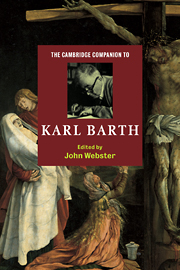Book contents
- Frontmatter
- 1 Introducing Barth
- 2 Theology
- 3 Revelation
- 4 The Bible
- 5 The Trinity
- 6 Grace and being
- 7 Creation and providence
- 8 Karl Barth’s Christology
- 9 Salvation
- 10 The humanity of the human person in Karl Barth’s anthropology
- 11 The mediator of communion
- 12 Christian community, baptism, and Lord’s Supper
- 13 Barth’s trinitarian ethic
- 14 Karl Barth and politics
- 15 Religion and the religions
- 16 Barth and feminism
- 17 Barth, modernity, and postmodernity
- 18 Karl Barth
- Index
17 - Barth, modernity, and postmodernity
Published online by Cambridge University Press: 28 May 2006
- Frontmatter
- 1 Introducing Barth
- 2 Theology
- 3 Revelation
- 4 The Bible
- 5 The Trinity
- 6 Grace and being
- 7 Creation and providence
- 8 Karl Barth’s Christology
- 9 Salvation
- 10 The humanity of the human person in Karl Barth’s anthropology
- 11 The mediator of communion
- 12 Christian community, baptism, and Lord’s Supper
- 13 Barth’s trinitarian ethic
- 14 Karl Barth and politics
- 15 Religion and the religions
- 16 Barth and feminism
- 17 Barth, modernity, and postmodernity
- 18 Karl Barth
- Index
Summary
INTRODUCTION
There are several narratives of the years between our own and those of the thirteenth century, all of which have helped to produce the notions of 'modernity' and 'postmodernity'. A number of these narratives have a similar plot structure. For example: the dawn of modernity is evident in the seventeenth century; it arises from/with a new sensibility shaped by figures such as Galileo and Descartes, Hobbes, and Newton; it is characterized by a new confidence in the reasoning subject and by the establishment of a world order to be understood according to the laws of geometry, mathematics, and mechanics; and it is governed by secularized forms of power: nation states, social contracts, civic policing, and judiciary courts. This new sensibility gradually eclipses the ancien régime and fosters the Enlightenment. Romanticism, though in some ways a critique of the preceding rational utopias, shifted the way the world was modelled from mechanical to organic and immanently evolving orders. The anthropological centring of this world view remained, the sciences still offered their culturally significant account of Nature, and the realm of the theological became increasingly privatized as attention turned to interior, spiritual experience. Now two world wars, the genocidal projects of Hitler, the Khmer Rouge, and Idi Amin announce a new sensibility. Late capitalism, with its call for the value of goods to be regulated by the demands of the market, with its mass media promotions, and its fostering of virtual money (electronic banking and credit), produces the globalisms and eclecticisms of postmodernity. The old grand narratives, that gave the world and human experience of it its explanatory shape, have collapsed. Key figures in the promotion of this new sensibility are French and American: Michel Foucault, Jacques Lacan, Jacques Derrida, Jean Baudrillard, Stanley Fish, Charles Jencks, and Judith Butler.
- Type
- Chapter
- Information
- The Cambridge Companion to Karl Barth , pp. 274 - 295Publisher: Cambridge University PressPrint publication year: 2000

